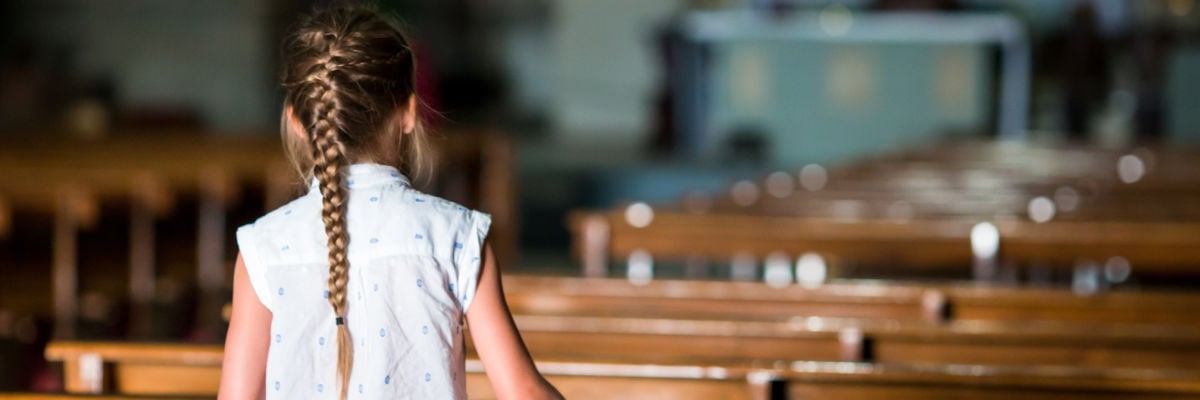
The presence and management of children at Mass is an issue that can generate more heat than light. I would like to tackle it here on the basis of a slightly deeper set of principles than is usual.
Full disclosure: I am a father of nine; my youngest has recently turned three. We have had to manage a child under five at Mass since our first was born in 2003; for most of the time, we’ve had two under five. That may sound extreme, but even a couple who have just three children at three-year intervals will have a child under five, and sometimes two of them, for eleven years. This is a big chunk of your life.
The first question is whether bringing small children to Mass is good in principle. Children under the “age of reason” (usually about seven) are not bound by canon law to attend Mass. Often parents have no choice but to bring them in order to attend themselves. But supposing they had the choice—if they could attend different Masses, or leave the children with friends—is the ideal to bring them or leave them behind?
One consideration is the importance of attending Mass together as a family. Children need to see their parents on their knees before Our Lord.
Another is that children need to learn how to behave in church by being there. I’ll come back to this point, but the expectations and cues involved in Mass attendance are not the same as for being in a restaurant, art gallery, or classroom. Furthermore, it is not the case that a seven-year-old with no experience of church will be more tractable than a three-year-old who has always gone. If you want to control your seven-year-old in church, you need to prepare the ground.
The third consideration may surprise readers: babies and small children benefit spiritually from the liturgy. First, the habits of prayer and attention to the liturgy they begin to develop are virtues. Second, the liturgy has a direct effect on them. In the Old Testament, “little ones” and “babies at the breast” are explicitly commanded to attend the solemn proclamation of the Law on two occasions (Deut. 31:12, Joel 2:15-7). In the Gospels, Jesus proposed children not as marginal liturgical participants, but as ideal ones, both in receiving his blessing (Matt. 19:13-15, Mark 10:13-16, Luke 18:15-17), and in singing at his solemn entry into Jerusalem (Matt. 21:15-16), in both cases defending this idea against objections.
Babies are given baptism; in some Eastern Rites, they are immediately confirmed and then regularly given Holy Communion. I’ve no quarrel with the Latin Rite discipline of delaying Holy Communion until the age of reason—it used to be much older—but we should not condemn the Eastern practice. If babies can be baptized, they can receive Holy Communion. Before the age of reason, they are without sin. In a similar way, patients in a coma can receive extreme unction.
Again, small children can receive the blessings that are given in the liturgy. In addition to the blessing at the end of Mass, the priest blesses us every time he says, “The Lord be with you” or “Peace be with you,” and when he gives the absolution after the Confiteor. He blesses the congregation with the Blessed Sacrament in Benediction, and with holy water in the Asperges. He blesses individuals with relics, blessed candles, and blessed ash. There are similar absolutions, sprinklings, and blessings in the Liturgy of the Hours.
The influence of rationalism is strong in our society, so I labor this point. Sacraments give grace to those open to it, not only to those who may have engaged intellectually with liturgical texts. Blessings (and exorcisms) not only increase our devotion, but combat the influence of Satan. The Catholic liturgy and sacramental system are not solely about eliciting an intellectual or emotional response; we have something stronger than that, something with objective efficacy.
If this is so, it follows that the ideal situation is where children of all ages accompany their parents at the liturgy, and we should encourage and support parents in bringing their children to church.
How do we do this? I believe that the best way to think about it is in terms of a culture: a set of practices, expectations, and attitudes, diffused through the whole community, which smooths the way for the raising of Catholic children, and attendance at Mass by everyone else as well. However, cultures are not built in a day. If things are not working well, there is no quick solution. Expectations need to be recalibrated, habits established, strategies tested. These things take time.
In every social media exchange on this subject, people complain about parents failing to control children. We can’t see the reality of the experiences behind these statements, but where these terrible parents really exist, the best person to tackle the problem is the pastor, in private. People exasperated at the situation should take their problems to him.
What I do know from personal experience is that some people would be satisfied only if children were completely absent from church. If we accept that having children in church is the ideal, there has to be some compromise from these non-parents. They must learn to tolerate a degree of movement and low-level noise, and remember how the catechisms define prayer: the lifting up of the mind and heart to God. You may prefer to pray in an atmosphere of complete quiet, but the effort to pray among distractions may be a better prayer.
The tut-tutting, sour comments, and dirty looks parents receive, from members of the congregation or indeed from the sanctuary or pulpit, are not only disheartening, but make their job infinitely more difficult, because it makes them tense. This communicates itself to small children, whose behavior becomes worse. As a strategy for dealing with misbehaving children, ticking parents off in public is massively counter-productive.
It is much harder for parents today than it was for previous generations. The lack of children in most churches makes those that do show up the focus of everyone’s attention, deprives new parents of role models, and encourages people to get used to zero background noise. At the same time, were parents publicly to adopt the parenting styles of our predecessors in the Faith—who, our critics like to say, never tolerated bad behavior from their children—members of the public would ring the police.
Many readers will be thinking at this point: just send parents and children into cry rooms, and the problem is solved. This is a solution, however, not in the sense that it helps to establish the habits I have been talking about, but in the sense that it makes those habits—and the culture that will arise from fostering them—less necessary. If all the small children in the congregation are in a soundproof box, parents need not develop strategies for dealing with their children, children need not develop habits of prayerfulness in church, and other members of the congregation need not get used to children being around.
Indeed, on the first, parents sometimes feel that they can let their children run riot in a cry room, since they are inaudible to the majority of the congregation. On the second, children are removed from the example of older children and adults, and the atmosphere of the liturgy, so are less likely to develop habits of quiet and prayerfulness. On the third, cry rooms can make non-parents less tolerant of children making a noise in the main church, since, they will say, they should be in the cry room.
Now, in a community with a very pro-family ethos, they could be just another option, alongside taking children outside or letting them play at the back. It takes only a couple of grumpy comments, however, to make parents feel that being outside the cry room is like being on parole. One squeak from the little one, and they’re going to be blamed, and far more than if there were no cry room.
I want to end this article by reiterating two points. The first is the importance of developing habits of prayer in small children. This cannot be done by leaving them at home when everyone else goes to Mass, though this is not wrong in itself. It cannot be done by letting them make as much noise as they like in a cry room, even if that is sometimes convenient. It cannot be done by taking them outside, though this may frequently be necessary. It is done not by taking them out, but by bringing them in to Mass, by exposing them to the atmosphere of the liturgy, and consistently encouraging them, over a period of years, to be quiet, and as they get older, to attend more closely to the action of the Mass. This process is best done in a liturgy that is not itself noisy or chaotic. It is going to bring some noise and disturbance into that liturgy, but this is something the whole community can value and support.
The second point is that parents can be looking after small children at Mass for many, many years, and they need to be included in the community with respect during that time. If parents are driven out of our churches when they are having difficulties with small children, they won’t come back later on. If we don’t welcome parents, there will not be another generation of Catholics.



